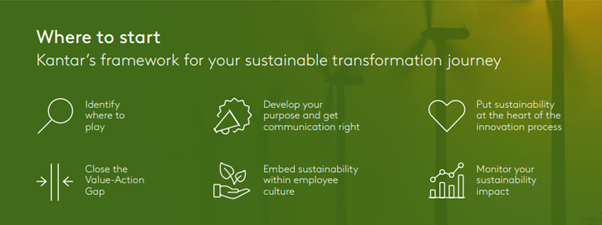
Road to Sustainability: Mark Kennedy, Senior Partner at Kantar Australia shares some key learnings from conversations Kantar are having with clients tackling sustainability
The why of sustainability and footprint is very rapidly giving way to the how.
The conversation about why will certainly carry on but personally, I have much more interest in the “so what” than the “should we bother”.
The so what challenge for most businesses is centred around the seeming complexity of sustainability, after all the UN have a cool 17 sustainable development goals and they are all urgent, and the very pragmatic question “where do I start?”
With that in mind, we hope sharing a few key learnings may be helpful.
Words are cheap and lack clear meaning, so action needs to be relevant and impactful. Cynicism around the word sustainability and the language around it is increasing very quickly. Sustainability can very easily fall into the selling pitch bucket or can seem like the organisation is green washing. The businesses that are performing best are those that are taking clear and impactful action, that relates to their day job. Frankly a broad statement about footprint reduction doesn’t mean much to many people. Pick an action that relates specifically to the work you do and be very specific about the people and environments you are positively benefiting.
The road to sustainability can be thankless but letting that stop you will create greater pain in the future. Organisations are increasingly taking on big, expensive challenges to restructure their business models and reduce their footprint and are then left surprised that they are not thanked for it. This isn’t because people don’t care but it is because expectation is outpacing action. Very often businesses are announcing bold moves that many people feel they should have implemented years ago. The flip side of this is increasingly if organisations haven’t acted, the negative impact on perception and equity can be significant. So don’t expect plaudits, just work hard to avoid being left behind.
The best place to start is by thinking inside out not outside in. Lastly, the internal audience of the organisation are often far more interested and impacted by sustainability action than the outside audience. They are simply more interested and ambitious for the organisation they are part of, and this is increasingly driving who they aspire to work for. In a talent dependant industry where talent is hard to find, the organisations sustainability strategy can make the difference between growth and stagnation. If your strategy isn’t credible and motivation to your internal team, it is very unlikely to inspire people external to the business.
A complex and fascination subject and we hope these ideas are useful and inspire an every increasingly important conversation.
For further information and resources kantaraustralia.com/sustainability